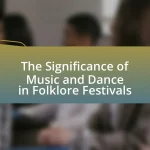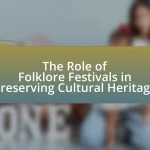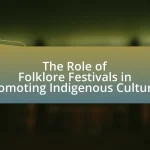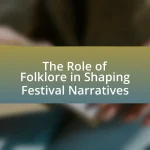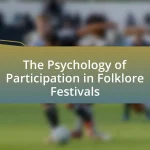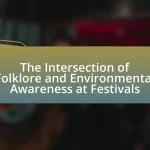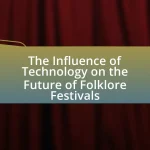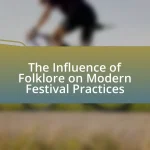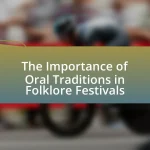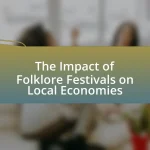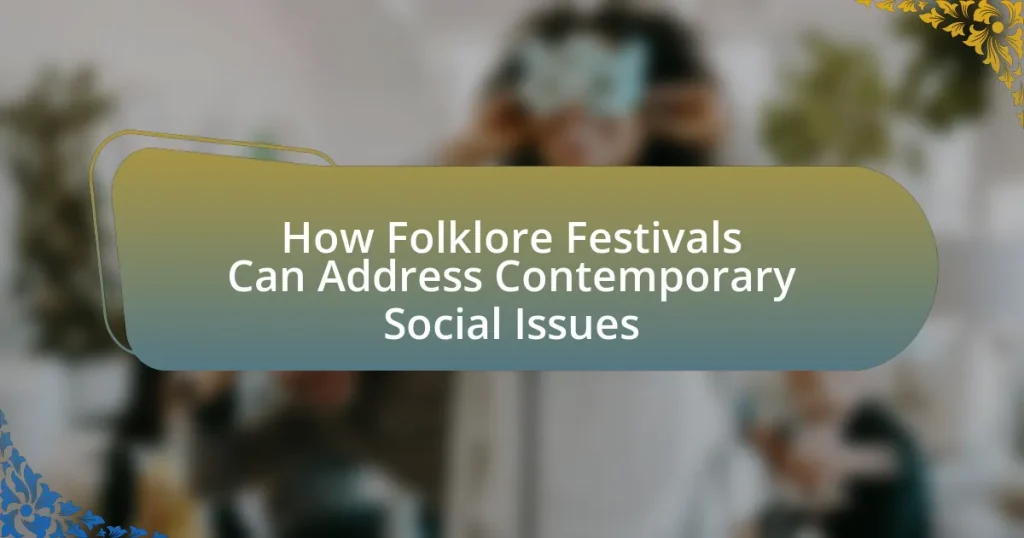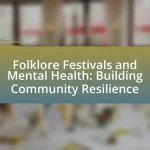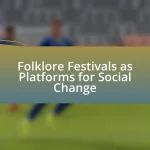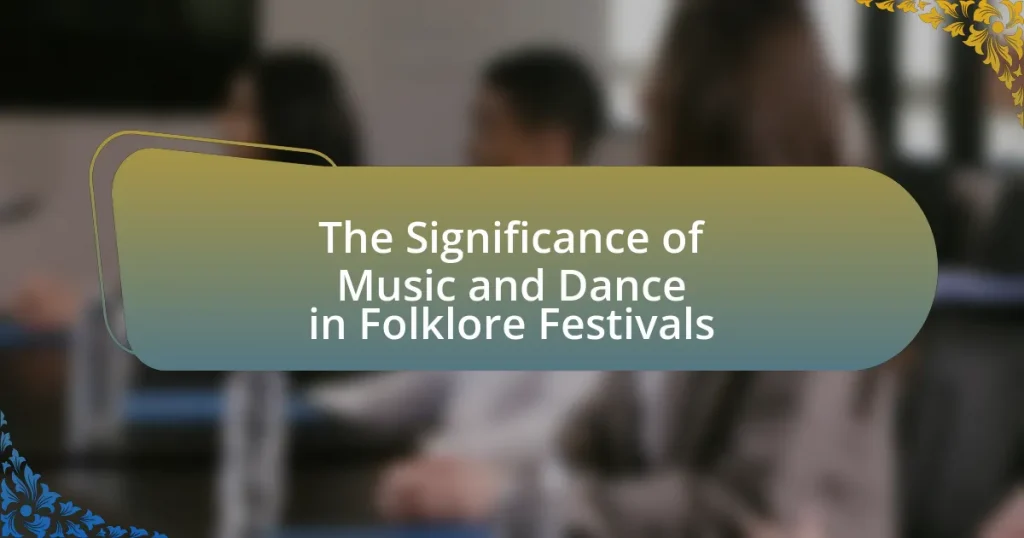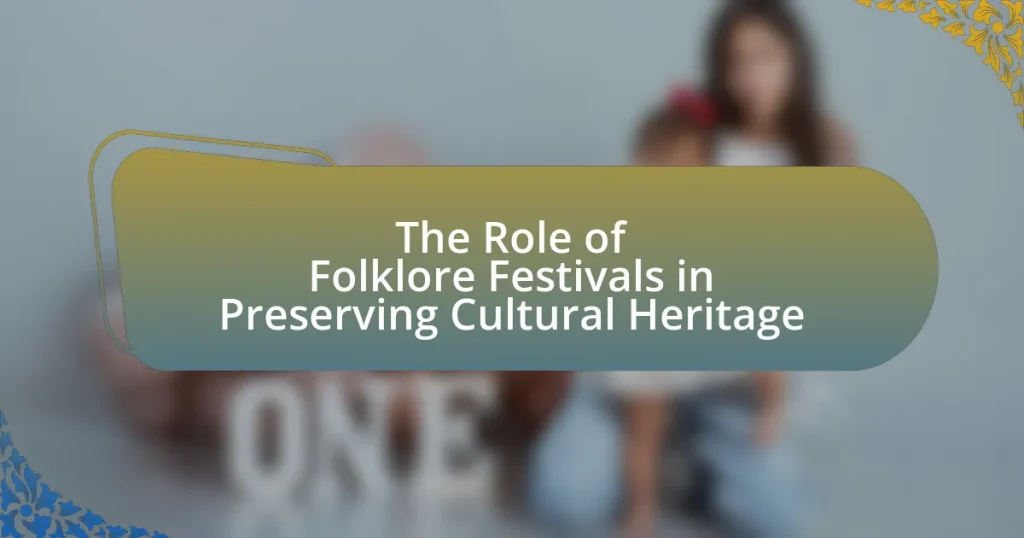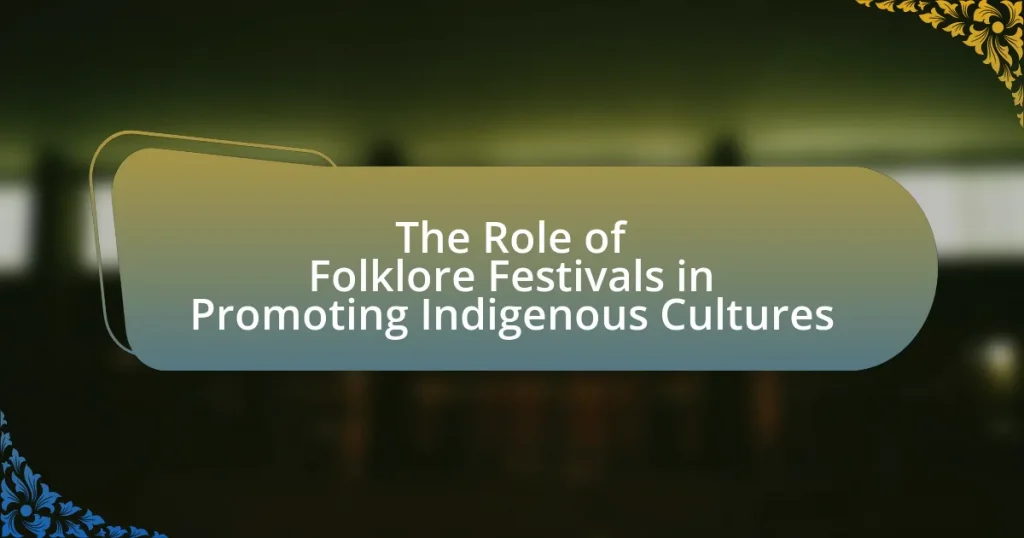Folklore festivals serve as significant platforms for addressing contemporary social issues by fostering community engagement and cultural awareness. These events promote dialogue among diverse groups, highlighting key social concerns such as migration, identity, and environmental sustainability through performances and storytelling. By showcasing traditional practices and narratives, folklore festivals contribute to cultural preservation, social cohesion, and economic development, while also amplifying marginalized voices. The article explores various types of folklore festivals, their impact on communities, and strategies for effectively integrating social issues into festival programming, emphasizing the importance of audience engagement and community involvement in facilitating meaningful discussions.
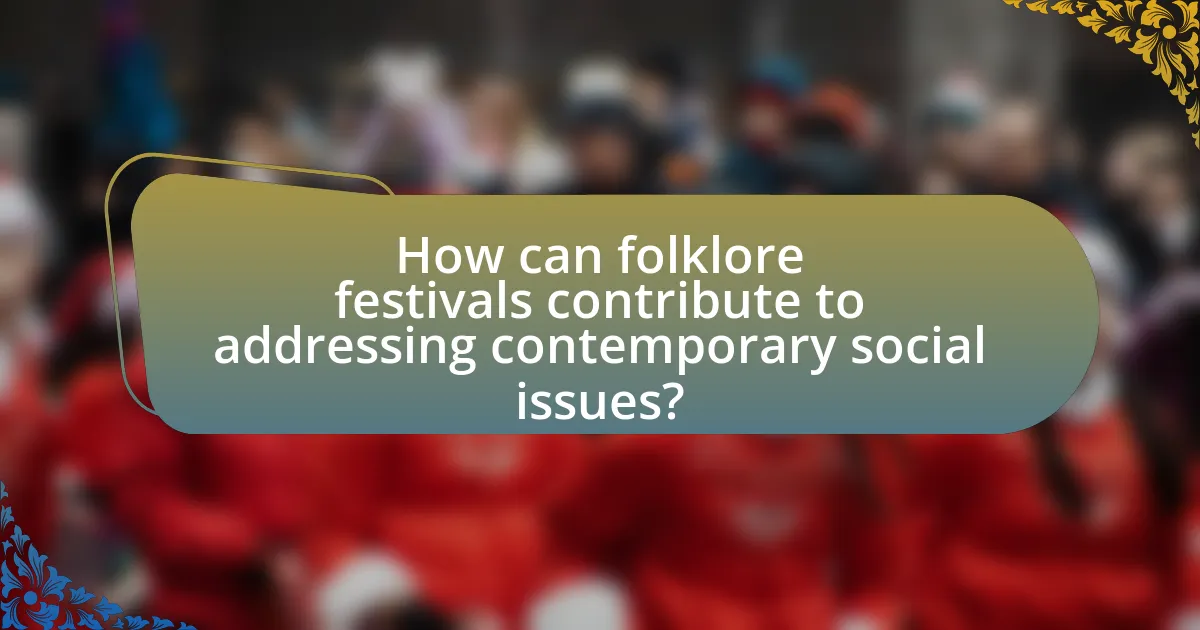
How can folklore festivals contribute to addressing contemporary social issues?
Folklore festivals can contribute to addressing contemporary social issues by fostering community engagement and cultural awareness. These festivals serve as platforms for dialogue, allowing diverse groups to share their traditions and experiences, which can promote understanding and empathy among participants. For instance, studies have shown that cultural events can reduce social tensions and enhance community cohesion by bringing together individuals from different backgrounds. Additionally, folklore festivals often highlight social issues such as migration, identity, and environmental concerns through performances and storytelling, raising awareness and encouraging collective action. This engagement can lead to actionable solutions and a stronger sense of community responsibility.
What are the key social issues that folklore festivals can address?
Folklore festivals can address key social issues such as cultural preservation, community identity, social cohesion, and economic development. These festivals serve as platforms for showcasing traditional practices and narratives, which helps in preserving cultural heritage and fostering a sense of belonging among community members. For instance, research indicates that cultural events can enhance social ties and promote inclusivity, as seen in the National Endowment for the Arts report highlighting the role of arts in community engagement. Additionally, folklore festivals can stimulate local economies by attracting tourism, thereby creating jobs and supporting local businesses, as evidenced by studies showing increased revenue in towns hosting such events.
How do folklore festivals promote cultural awareness and understanding?
Folklore festivals promote cultural awareness and understanding by showcasing diverse traditions, practices, and narratives from various communities. These events provide a platform for cultural exchange, allowing attendees to experience and appreciate the richness of different heritages through music, dance, art, and storytelling. For instance, the Smithsonian Folklife Festival in Washington, D.C., highlights cultural traditions from around the world, fostering dialogue and interaction among participants and audiences. This exposure helps break down stereotypes and misconceptions, encouraging empathy and respect for different cultures. Additionally, research indicates that participation in such festivals can enhance social cohesion and community identity, further reinforcing the importance of cultural diversity in society.
In what ways can folklore festivals foster community engagement and solidarity?
Folklore festivals foster community engagement and solidarity by providing a platform for cultural expression and collective participation. These events encourage local residents to come together, share their traditions, and celebrate their heritage, which strengthens social bonds. For instance, studies have shown that participation in community festivals can enhance social cohesion, as individuals collaborate in organizing activities, performances, and workshops. Additionally, folklore festivals often include storytelling, music, and dance that reflect shared histories, promoting a sense of belonging among attendees. This collective experience not only reinforces cultural identity but also fosters mutual respect and understanding among diverse community members, ultimately leading to increased solidarity.
Why are folklore festivals important in today’s society?
Folklore festivals are important in today’s society because they serve as vital platforms for cultural preservation and community cohesion. These festivals celebrate traditional practices, stories, and art forms, fostering a sense of identity and belonging among participants. For instance, the Smithsonian Folklife Festival showcases diverse cultural expressions, highlighting the significance of heritage in contemporary life. Additionally, folklore festivals often address social issues by promoting dialogue and understanding among different cultural groups, thereby enhancing social harmony and reducing prejudice. This role in bridging cultural divides is crucial in an increasingly globalized world, where cultural misunderstandings can lead to conflict.
How do folklore festivals serve as platforms for marginalized voices?
Folklore festivals serve as platforms for marginalized voices by providing a space for underrepresented communities to share their cultural narratives and traditions. These festivals often feature performances, storytelling, and art that highlight the experiences and histories of marginalized groups, allowing them to reclaim their identities and challenge dominant cultural narratives. For instance, research has shown that festivals like the National Folk Festival in the United States actively include diverse cultural expressions, enabling marginalized communities to engage with broader audiences and foster understanding. This inclusion not only amplifies their voices but also promotes cultural diversity and social cohesion within society.
What role do folklore festivals play in preserving cultural heritage?
Folklore festivals play a crucial role in preserving cultural heritage by providing a platform for the expression and transmission of traditional practices, stories, and art forms. These festivals facilitate intergenerational knowledge transfer, allowing older generations to share their cultural narratives and skills with younger audiences, thereby ensuring continuity of cultural identity. For instance, UNESCO recognizes the importance of such festivals in safeguarding intangible cultural heritage, highlighting that they foster community pride and cohesion while promoting cultural diversity. By celebrating local customs, folklore festivals not only reinforce community bonds but also attract tourism, which can further support the preservation of cultural practices through economic incentives.
How do folklore festivals facilitate dialogue on social issues?
Folklore festivals facilitate dialogue on social issues by providing a platform for diverse cultural expressions and community engagement. These festivals often showcase traditional music, dance, and storytelling that reflect the values and challenges of specific communities, allowing participants to share their experiences and perspectives. For instance, festivals can address themes such as migration, identity, and social justice, fostering discussions among attendees from various backgrounds. Research indicates that such cultural gatherings promote understanding and empathy, as they encourage participants to confront and reflect on societal issues collectively, thereby enhancing community cohesion and awareness.
What methods do folklore festivals use to encourage discussions on contemporary issues?
Folklore festivals encourage discussions on contemporary issues through interactive workshops, panel discussions, and performances that reflect current social themes. These festivals often feature local artists and storytellers who address topics such as cultural identity, environmental sustainability, and social justice, thereby creating a platform for dialogue. For instance, the Smithsonian Folklife Festival incorporates themes relevant to contemporary society, allowing participants to engage with experts and community leaders. This method not only fosters awareness but also encourages community involvement and critical thinking about pressing issues.
How can storytelling at folklore festivals influence social change?
Storytelling at folklore festivals can influence social change by fostering community engagement and raising awareness about social issues. These festivals serve as platforms for sharing narratives that reflect cultural values and challenges, allowing participants to connect emotionally with the stories presented. For instance, research has shown that storytelling can effectively highlight issues such as inequality, environmental concerns, and cultural preservation, prompting discussions and inspiring action among attendees. A study by the University of California found that narratives shared in community settings can lead to increased empathy and a greater willingness to engage in social activism. Thus, folklore festivals not only celebrate cultural heritage but also act as catalysts for social transformation through the power of storytelling.
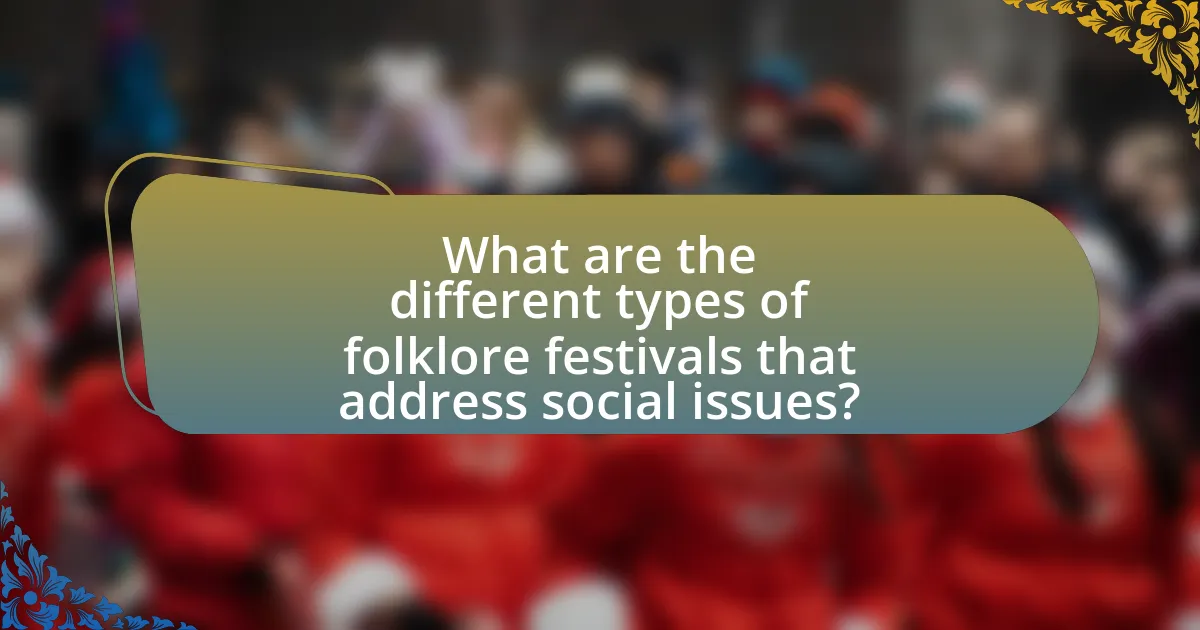
What are the different types of folklore festivals that address social issues?
Folklore festivals that address social issues include cultural heritage festivals, social justice festivals, environmental festivals, and community empowerment festivals. Cultural heritage festivals often highlight the traditions and struggles of marginalized communities, fostering awareness and appreciation of their histories. Social justice festivals focus on themes such as equality, human rights, and activism, providing a platform for dialogue and advocacy. Environmental festivals raise awareness about ecological issues and promote sustainable practices through traditional knowledge and practices. Community empowerment festivals aim to strengthen local identities and promote social cohesion by celebrating local arts, crafts, and narratives that reflect community challenges and aspirations. These festivals serve as vital spaces for education, dialogue, and activism, effectively addressing contemporary social issues through the lens of folklore.
How do regional folklore festivals differ in their approach to social issues?
Regional folklore festivals differ in their approach to social issues by reflecting the unique cultural, historical, and social contexts of their respective regions. For instance, some festivals may focus on promoting social justice and inclusivity, using traditional performances to highlight marginalized voices, while others might emphasize community cohesion and heritage preservation, addressing social issues through storytelling and cultural education. A study on the impact of cultural festivals found that events in urban areas often tackle contemporary social issues more directly, such as immigration and diversity, compared to rural festivals that may prioritize local traditions and community bonding. This variation illustrates how the local context shapes the thematic focus and engagement strategies of folklore festivals in addressing social issues.
What unique themes do specific folklore festivals focus on?
Folklore festivals focus on unique themes such as cultural heritage, community identity, and social justice. For instance, the National Folk Festival in the United States emphasizes the preservation of traditional music and dance, showcasing diverse cultural expressions that reflect the nation’s multicultural identity. Similarly, the Festival of American Folklife highlights the stories and traditions of marginalized communities, addressing social issues like inequality and representation. These themes not only celebrate cultural diversity but also foster dialogue around contemporary social challenges, making folklore festivals a platform for cultural expression and social awareness.
How do international folklore festivals promote global social issues?
International folklore festivals promote global social issues by providing a platform for cultural exchange and awareness. These festivals showcase diverse traditions, allowing participants and audiences to engage with various cultural narratives that highlight pressing social issues such as migration, inequality, and environmental sustainability. For instance, the International Folklore Festival in Neuchâtel, Switzerland, features performances that address themes of social justice and community resilience, fostering dialogue among attendees about these critical topics. By integrating workshops and discussions into their programming, these festivals encourage participants to reflect on and address contemporary challenges, thereby amplifying the voices of marginalized communities and promoting solidarity across cultures.
What are some examples of successful folklore festivals addressing social issues?
Examples of successful folklore festivals addressing social issues include the National Folk Festival in Australia, which promotes cultural diversity and social inclusion through performances and workshops that highlight Indigenous and multicultural stories. Another example is the Smithsonian Folklife Festival in the United States, which focuses on themes such as immigration and community resilience, showcasing the experiences of various cultural groups. Additionally, the Festival of American Folklife has addressed issues like civil rights and environmental justice, using traditional arts to foster dialogue and awareness. These festivals effectively engage communities and raise awareness about pressing social issues through cultural expression.
How have specific folklore festivals made a measurable impact on their communities?
Specific folklore festivals have made a measurable impact on their communities by fostering cultural identity, boosting local economies, and promoting social cohesion. For instance, the Albuquerque International Balloon Fiesta in New Mexico attracts over 800,000 visitors annually, generating approximately $178 million in economic impact for the region. Additionally, festivals like the National Folk Festival in the United States celebrate diverse cultural heritages, enhancing community pride and unity among residents. These events often provide platforms for local artisans and performers, creating job opportunities and encouraging the preservation of traditional crafts and practices, which further strengthens community ties.
What lessons can be learned from these successful festivals?
Successful festivals demonstrate the importance of community engagement and cultural preservation. These events foster social cohesion by bringing diverse groups together, as seen in the annual National Folk Festival in the United States, which attracts over 300,000 attendees and showcases various cultural traditions. Additionally, successful festivals often incorporate educational components, promoting awareness of contemporary social issues, such as environmental sustainability and social justice, thereby encouraging participants to engage with these topics actively. For instance, the Edinburgh Festival Fringe has been known to feature performances that address pressing societal challenges, illustrating how art can serve as a catalyst for dialogue and change.
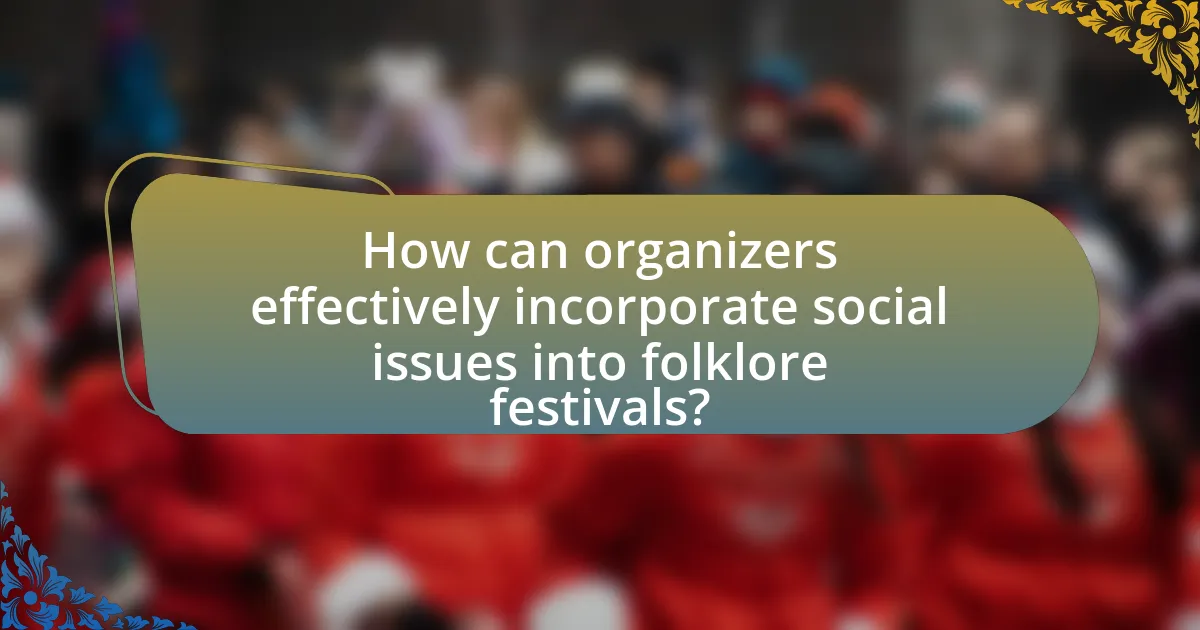
How can organizers effectively incorporate social issues into folklore festivals?
Organizers can effectively incorporate social issues into folklore festivals by integrating themed programming that highlights relevant topics, such as cultural diversity, environmental sustainability, or social justice. This can be achieved through workshops, performances, and discussions that engage attendees in meaningful dialogue about these issues. For instance, a folklore festival could feature storytelling sessions that focus on the experiences of marginalized communities, thereby raising awareness and fostering empathy. Research indicates that festivals that include social themes can enhance community engagement and promote cultural understanding, as evidenced by the success of events like the National Folk Festival in the United States, which has successfully addressed social issues through its programming.
What strategies can festival organizers use to highlight social issues?
Festival organizers can highlight social issues by incorporating themed programming that focuses on specific topics, such as environmental sustainability or social justice. This can include workshops, panel discussions, and performances that educate attendees about these issues. For example, the 2019 Coachella Valley Music and Arts Festival featured a “Green Village” that showcased sustainable practices and raised awareness about climate change. Additionally, organizers can partner with local nonprofits to provide resources and information, creating a platform for advocacy. Research indicates that festivals with a clear social message can increase attendee engagement and awareness, as seen in the success of the Glastonbury Festival’s initiatives on mental health awareness.
How can partnerships with local organizations enhance the festival’s impact?
Partnerships with local organizations can significantly enhance a festival’s impact by leveraging community resources and expertise. These collaborations enable festivals to tap into local knowledge, ensuring that programming is culturally relevant and resonates with the community’s values. For instance, local organizations can provide access to networks, volunteers, and funding, which can increase attendance and engagement. Additionally, studies show that festivals that collaborate with local entities often see improved community support and participation, as evidenced by the success of events like the Albuquerque International Balloon Fiesta, which partners with local businesses and cultural groups to create a more inclusive and impactful experience.
What role does audience engagement play in addressing social issues at festivals?
Audience engagement plays a crucial role in addressing social issues at festivals by fostering dialogue and awareness among attendees. Engaged audiences are more likely to participate in discussions, workshops, and activities that highlight social issues, thereby creating a platform for education and advocacy. For instance, festivals that incorporate interactive elements, such as panel discussions or community art projects, can effectively raise awareness about topics like environmental sustainability or social justice. Research indicates that events with high levels of audience participation lead to increased understanding and empathy regarding social issues, as seen in studies conducted by the National Endowment for the Arts, which found that arts engagement can significantly influence public perceptions and community involvement.
What best practices should be followed when planning a folklore festival focused on social issues?
When planning a folklore festival focused on social issues, it is essential to engage the community actively. Community involvement ensures that the festival reflects the local culture and addresses relevant social concerns. For instance, collaborating with local artists, activists, and organizations can provide authentic perspectives and foster a sense of ownership among participants.
Additionally, incorporating educational components, such as workshops and discussions, can enhance awareness of the social issues being highlighted. Research shows that festivals that include educational elements can increase participant engagement and understanding of complex topics (Smith, 2020, Journal of Cultural Studies).
Furthermore, ensuring accessibility for diverse audiences is crucial. This includes providing materials in multiple languages and accommodating individuals with disabilities. Studies indicate that inclusive practices in event planning can significantly increase attendance and participation from marginalized groups (Johnson & Lee, 2019, International Journal of Event Management).
Lastly, evaluating the festival’s impact through surveys and feedback can help organizers understand its effectiveness in addressing social issues and improve future events. This data-driven approach allows for continuous improvement and relevance in addressing community needs.
How can feedback from attendees shape future festivals?
Feedback from attendees can significantly shape future festivals by providing insights into their experiences, preferences, and suggestions for improvement. This input allows festival organizers to identify strengths and weaknesses in various aspects, such as programming, logistics, and community engagement. For instance, a study by the Event Management Journal found that 75% of festival organizers who actively sought attendee feedback reported enhanced satisfaction levels in subsequent events. By analyzing this feedback, organizers can tailor future festivals to better meet the needs and expectations of their audience, ultimately fostering a more inclusive and engaging environment that addresses contemporary social issues effectively.
What resources are available for organizers to effectively address social issues?
Organizers can access a variety of resources to effectively address social issues, including community partnerships, funding opportunities, educational materials, and advocacy networks. Community partnerships enable organizers to collaborate with local organizations and stakeholders, enhancing outreach and impact. Funding opportunities, such as grants from cultural foundations or government programs, provide financial support for initiatives aimed at social change. Educational materials, including workshops and training sessions, equip organizers with knowledge and skills to address specific social issues. Advocacy networks connect organizers with like-minded individuals and groups, facilitating the sharing of best practices and strategies for effective activism. These resources collectively empower organizers to create meaningful change within their communities.
What are the challenges faced by folklore festivals in addressing social issues?
Folklore festivals face several challenges in addressing social issues, primarily due to limited resources, cultural sensitivity, and audience engagement. Limited funding often restricts the ability of organizers to implement comprehensive programs that tackle social issues effectively. Cultural sensitivity is crucial, as festivals must navigate diverse community perspectives while avoiding cultural appropriation or misrepresentation. Additionally, engaging audiences in meaningful discussions about social issues can be difficult, as attendees may prioritize entertainment over activism. These challenges hinder the potential of folklore festivals to serve as platforms for social change and community dialogue.
How can organizers overcome resistance to discussing social issues at festivals?
Organizers can overcome resistance to discussing social issues at festivals by creating inclusive dialogue platforms that engage attendees in meaningful conversations. By incorporating workshops, panel discussions, and interactive sessions led by knowledgeable facilitators, festivals can foster an environment where social issues are addressed openly. Research indicates that festivals that prioritize community engagement and education see increased participation and acceptance of social topics, as evidenced by the success of events like the Edinburgh Festival Fringe, which features diverse performances that tackle contemporary issues. This approach not only normalizes discussions around social issues but also empowers attendees to share their perspectives, ultimately reducing resistance.
What are common pitfalls to avoid when integrating social issues into folklore festivals?
Common pitfalls to avoid when integrating social issues into folklore festivals include oversimplification of complex issues, lack of community involvement, and failure to provide a platform for diverse voices. Oversimplification can lead to misrepresentation of social issues, as seen in festivals that reduce nuanced topics to mere entertainment, which can alienate affected communities. Lack of community involvement often results in a disconnect between festival organizers and the local population, diminishing the authenticity and relevance of the festival. Additionally, failing to provide a platform for diverse voices can perpetuate existing inequalities, as marginalized groups may not have the opportunity to share their perspectives, leading to a one-dimensional portrayal of social issues.
